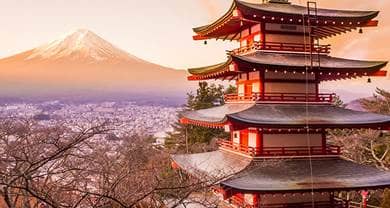- Trending:
- Pope Leo Xiv
- |
- Israel
- |
- Trump
- |
- Social Justice
- |
- Peace
- |
- Love

RELIGION LIBRARY
Japanese Religion
"Japanese Religion" is a general term used to describe the unique combination of a great variety of religious traditions within Japan. Religion in Japan reflects a long history during which various religious beliefs and practices—some indigenous, some "imported" from other places—have been adopted and adapted to Japanese culture. The ancient indigenous folk religion, later formalized as Shinto, was based on feelings of awe toward the sacred powers (kami) that brought life to the earth and human community. In the 6th century C.E., Buddhism was introduced into Japan; it both influenced Shinto beliefs and practices and also incorporated Shinto elements. Both Confucianism and Taoism migrated to Japan, impacting Japanese culture, religion, philosophy, and politics. Japanese religion adopted Chinese Buddhist rituals, Taoist story-telling and divination, as well as Confucian concepts of piety and ancestor veneration. New popular schools of Buddhism formed in Japan, taking on a structure of their own. Pure Land, Zen, and Nichiren Buddhism all developed in Japan, with the Nichiren school taking on a uniquely Japanese character. In the 16th century C.E., Western religion was introduced in Japan in the form of Christianity by Jesuit missionaries, including Francis Xavier. In response to this missionary activity, some Japanese led a resurgence of the ancient traditions of Shinto, Buddhism, and Confucianism. These complex, hybrid Japanese religions continue to play a significant role Japanese culture, although there is also a sense that, as in other contexts, much of the religious and spiritual heritage unique to Japan is being swallowed by modern secular life.
Quick Facts
| Formed | -400 |
| Adherents | 1,000,000 |
| Deity | Polytheistic, associated with natural and cosmological elements |
| Sacred Text | Various, including Kojiki, Nihonshoki |
| Origin | Japan |
| Headquarters | None |










